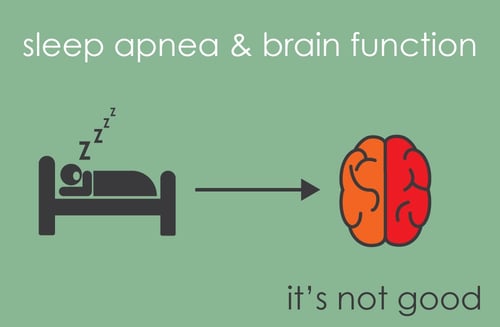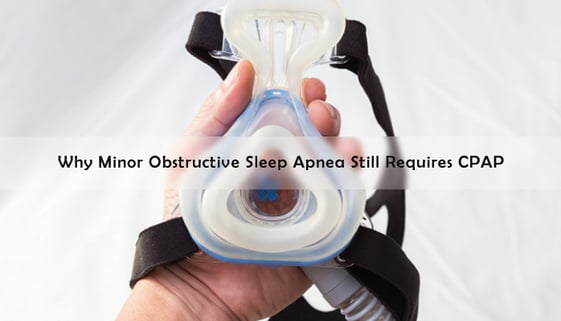What is Obstructive Sleep Apnea (OSA)?
Obstructive sleep apnea is a medical condition and sleeping disorder characterized by repeated cessations of breathing throughout the night, anywhere from 5-30 times an hour. During each pause, the body wakes up to begin breathing again, however, the sleeper will not remember these events. These pauses occur because the throat becomes blocked by collapsed muscles in the back of the neck during exhalation. Each blockage/arousal cycle is called an apnea or apnea event.
Risks of OSA
Risk of OSA are associated with:
- High blood pressure
- Diabetes
- Stroke
- Heart disease
- Shorter life expectancy
- Lower quality of life
- Lower performance in many areas of life
Symptoms of OSA
 Click the picture to read our blog article about OSA's negative effects on brain function
Click the picture to read our blog article about OSA's negative effects on brain function
Some of the most common symptoms of obstructive sleep apnea are:
- Loud snoring
- Restless sleep
- Morning headaches
- Daytime fogginess
- Severe daytime sleepiness
- Chronic irritability
Sleep apnea can be considered mild, moderate, or severe.
Sleep Apnea Stages
The general breakdown of what is considered mild, moderate, and severe OSA.
- Mild OSA: 5-14 apneas per hour of sleep
- Moderate OSA: 15-30 apneas per hour of sleep
- Severe OSA: 30+ apneas per hour of sleep
The problem with all stages, even mild, is the sleep deprivation that results from disrupted sleep. With severe apnea, one could rouse more than 240 times per night, which will cause severe sleep deprivation.
As a result, life may be shorter, unhappier, and less optimal than those with treated sleep apnea. Unfortunately, the risk factors are generally the same for mild-severe sleep apnea, the only difference may be the treatment used.
What is CPAP Therapy?
A CPAP device/machine stands for Continuous Positive Airway Pressure and is the primary treatment modality for sleep apnea. It is a small, rectangular box with a motorized fan inside and an adjacent humidifier (a humidification chamber is optional, but most people use it because a lack of humidification while using CPAP devices can lead to irritation in the nasal passage and throat).
Connected to the CPAP device is a flexible tube that leads to a breathing mask. The hose is lightweight and kept warm in order to reduce condensation. Too much condensation can lead to sanitation problems like mold growth.
Finally, the primary component in CPAP machines is a small fan inside. The small fan inside delivers gentle, positive pressure through a connected hose to the breathing mask. The result, no more lapses of breathing at night because the positive air pressure keeps your airway open. The pressure can be a little strange at first, but it’s rare that people report any long terms problems associated with it.
CPAP Treatment and Alternatives for Mild Sleep Apnea
Regardless of the severity of sleep apnea, CPAP therapy will likely be the prescribed remedy. However, CPAP therapy may be prescribed only after other, traditional, DIY options fail [resmed]. These include:
- Life style changes (eating, drinking, tobaco use, and exercise habits)
- Losing weight
- Changing sleep position
- Medication changes
Why is this the case? Because mild sleep apnea may be caused and cured by:
- Being overweight
- Excessive drinking, tobacco use, or poor eating habits
- Sleeping on your back
- Using certain medications
- Not exercising enough
Mild sleep apnea should still be addressed with the same seriousness as severe sleep apnea, because they both carry risks for:
- Lower quality of life
- Shortened life span
- Risks for heart disease and other health conditions
If you live in Alaska, and are concerned that you or a loved one has sleep apnea or has already been diagnosed, please consult with our sleep specialists about any questions you have.


